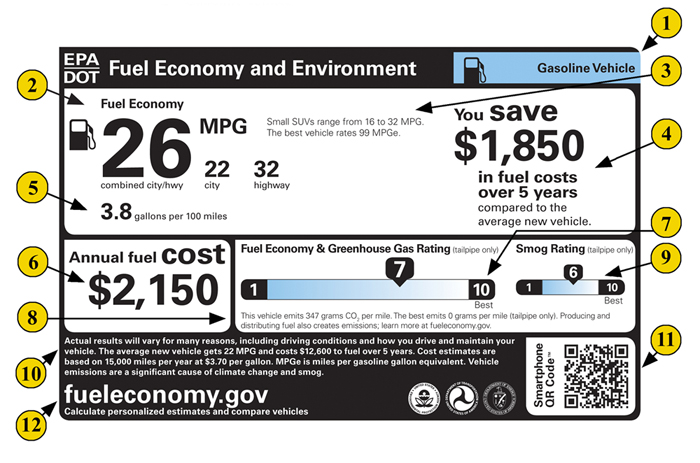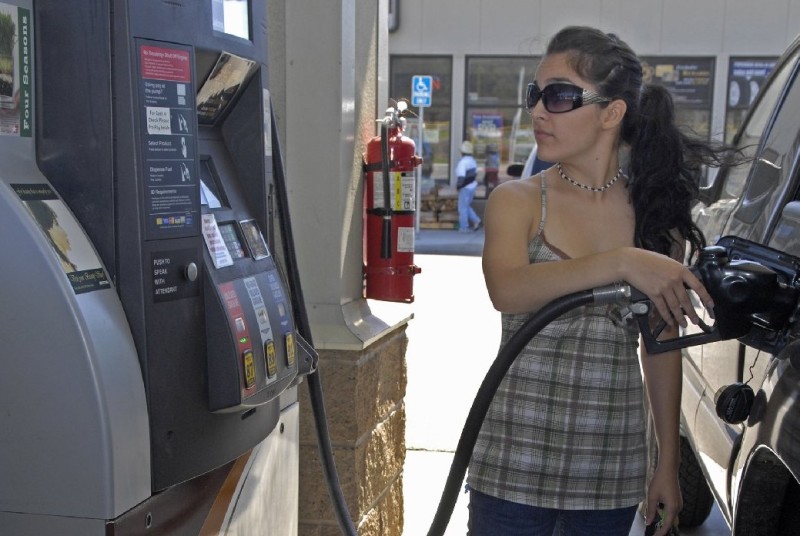b. Replacing the 15 MPG truck with a 20 MPG truck
The first option seems to make the most sense. But -- as you may have predicted -- it's not the right answer. In fact, choice b saves nearly twice as much gas (even though the new truck still requires way more gas than the old car). Here's the math to prove it:

If you guessed wrong, you're not alone. In a 2008 study published in Science Magazine, Richard P. Larrick and Jack B. Soll of Duke University suggest "there is a systematic misconception in judging fuel efficiency when it is expressed as miles per gallon." Namely, most drivers think gas usage falls linearly (in a straight line) as MPG increases. But the actual relationship between the two is curved: one additional MPG has significantly greater impact in the gas consumption of an inefficient vehicle than it does in a more efficient one. Essentially, it's the law of diminishing returns. The authors call this the "MPG Illusion," and note that encouraging gas guzzlers to upgrade to slightly more efficient vehicles actually has a much more positive impact than is commonly perceived.
"The environment would benefit most if all (car-driving) consumers chased highly efficient cars that get 40 MPG, not 14, and incentives should be tied to achieving such efficiency," the authors write. But, they argue, the impact of encouraging people who drive gas guzzling SUVs that get a measly 12 MPG to switch to ones that get a slightly less measly 14 MPG is certainly not negligible. "The 2 MPG improvement is actually a significant one in terms of reduction in gas consumption."
That logic is illustrated here:
It's true that 15 to 20 MPG is a bigger percentage jump than going from 28 to 38 MPG, But even when comparing proportions, the same logic holds true. The chart below shows the savings from a 50 percent boost in MPG. Note that the higher the MPG, the less gas a 50 percent boost saves.
The case for switching to gallons per mile
MPG, the study's authors argue, is a somewhat misleading measurement of fuel efficiency. Because it's a fraction with miles in the numerator and gallons in the denominator, it's a convenient measure for calculating answers in terms of miles. For example: "If my car has 5 gallons left in the tank, and it gets 30 miles per gallon, how many miles can I go without stopping for gas?"

In most cases, however, it's more useful to express your calculations in terms of gallons, since it is gallons, after all -- not miles -- that matter to your budget and the environment (especially considering that burning 100 gallons emits one ton of CO2). Therefore, it makes sense to flip the fraction, converting it to gallons per mile (GPM):

But because the small numbers can get confusing, it's easier to instead express this as gallons per hundred miles (GPHM):

When you put gallons in the numerator, comparing fuel usage is easy. The chart below shows how a 1 GPHM drop always saves the same amount of gasoline regardless of the vehicle's fuel efficiency.
Policy implications
So does this mean it's fine to buy a new gas guzzler as long as it's just a teeny bit more efficient than your old one?
Just the opposite. The higher the fuel efficiency of your replacement vehicle, the more gas you save. That's why Larrick and Soll argue that "removing the most inefficient vehicles is where policy and popular opinion should be focused." Ideally, all drivers of gas guzzlers would make a giant leap and swap their SUVs for very efficient small hybrids ... or bicycles. But that's a pretty unlikely possibility. So, given the restraints of reality, it's more important to encourage drivers of gas guzzlers to switch to normal cars, than it is to nudge drivers of normal cars to switch to hybrids.
The federal government has already taken steps in this direction: the Office of Information and Regulatory Affairs this year came out with "gallons per 100 miles" stickers, which they're are encouraging car dealerships to start using them in showrooms.

Lewis Lehe is a PhD student in Civil Engineering at the UC Berkeley, where he researches electronic road tolling and runs the Visualizing Urban Data idealab.





